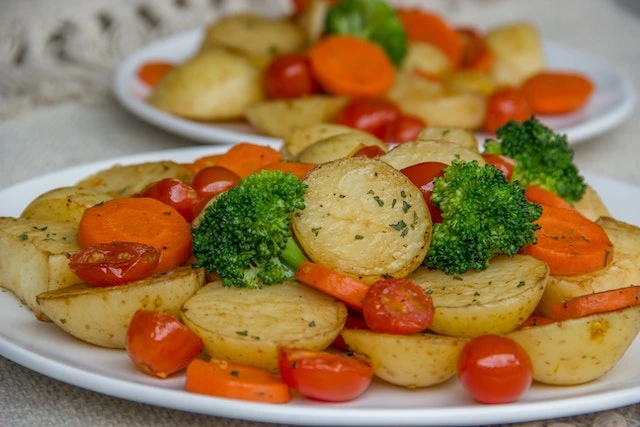Put Potatoes On Your Plate

![]() Download as PDF
Download as PDF
The lowly potato has gotten a bad rep. Many of us steer clear of potatoes, assuming that they are a fattening starch, or “bad carb”. The truth is, the potato is a powerhouse of good nutrients and dietary antioxidants, which help fight age-related diseases.
Potatoes are a good source of fibre, and of vitamins B-1, B-3, and B-6. B vitamins help to maintain healthy skin, and skeletal muscle tone and increase metabolic rate (more calories burned!). These vitamins also boost the production of red blood cells, which helps prevent anaemia, and also lower the risk of pancreatic cancer, when eaten in food, rather than in a vitamin tablet form. The potato’s complex carbohydrates (polysaccharides) help you to feel full longer.
Its high level of vitamin C – one potato with skin gives you almost half of your daily vitamin C requirement– and that helps you to absorb iron. A medium-sized potato weighs in at approximately only 85-150 calories, with very little fat.
However, the nutritional value of the potato on your plate changes radically in two ways – how it’s prepared, and what you put on it. All methods of cooking the potato will deplete some vitamins and minerals, but some methods cause greater change than others. Boiling them leaches away a fair amount of vitamin C, especially if the potato has been peeled. Baking also destroys a lot of vitamin C, but the baked potato retains a lot more of its other nutrients than its boiled counterpart. Of course, frying the potato for French fries or potato chips really decreases its nutritional value, and the potato absorbs a high percentage of fat as well.
The potato’s fate on your plate matters too. Regular butter, sour cream, bacon and so on are delicious - and dangerous. A tablespoon of regular butter has approximately 11 grams of fat, and 100 calories (this could double the calorie count of the potato!) Sour cream? Six grams of fat, and about 61 calories. Salsa is a good choice for a topping – virtually no fat, and about 35 calories for a quarter-cup. Or choos reduced-fat butter or sour cream, and be aware of how much you’re using.
So if you’ve banished the potato from your diet, take another look at this amazing source of complex carbohydrates, vitamins, minerals and protein, and invite it back into your kitchen!